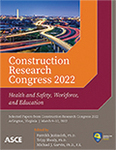VR-OnSite—Online Site Visits Using Web-Based Virtual Environments
Publication: Construction Research Congress 2022
ABSTRACT
Site visits or field trips have been a tool utilized by construction engineering and management educators to engage students in active learning, assist traditional lessons, and attain stronger and deeper student learning experiences. Nevertheless, site visits present major logistical and accessibility challenges, which reduces the number of students that have access to the benefits of such a technique. The limitations for site visits have further broadened recently, as COVID-19 public health concerns has forced educators to move to online course delivery quickly and the majority of site visits have been canceled. This study presents the development of VR-OnSite—a web-based virtual environment that offers a social field trip experience for large groups of students that resembles real-world jobsite conditions. A pilot study was conducted with sixteen students that followed a guided site visit within the context of a railway transportation project. The use of VR-OnSite resulted in statistically significant increase in student perceived knowledge in railway transportation and high engagement during the virtual site visit.
Get full access to this article
View all available purchase options and get full access to this chapter.
REFERENCES
Andrade, P., and Law, E. L. C. (2018). User-based evaluation of gamification elements in an educational application. In Proceedings of the 32nd International BCS Human Computer Interaction Conference 32 (pp. 1–13).
Arain, F. M., and Burkle, M. (2011). Learning construction project management in the virtual world: leveraging on second life. ITcon, 16(16), 243–258.
Allmendinger, K. (2010). Social presence in synchronous virtual learning situations: The role of nonverbal signals displayed by avatars. Educational Psychology Review, 22(1), 41–56.
Barlish, K. C., and Traylor, C. (2014). Career paths and development: Actions and examples from the heavy civil sector. Practice Periodical on Structural Design and Construction, 19(1), 2.
Chen, E., Kaczmarek, K., and Ohyama, H. (2020). Student perceptions of distance learning strategies during COVID‐19. Journal of dental education.
Eiris, R., and Gheisari, M. (2017). Site visit application in construction education: a descriptive study of faculty members. Journal of Construction Education and Research, 15(2), 83–99.
Eiris, R., Wen, J., and Gheisari, M. (2020). iVisit: Digital Interactive Construction Site Visits Using 360-Degree Panoramas and Virtual Humans. In Construction Research Congress 2020: Computer Applications (pp. 1106–1116). Reston, VA: ASCE.
Gomes-deSiqueira, A., Feijóo-García, P. G., Stuart, J., and Lok, B. (2021). Toward Facilitating Team Formation and Communication Through Avatar Based Interaction in Desktop-Based Immersive Virtual Environments. Frontiers in Virtual Reality, 2, 33.
Jaselskis, E. J., Jahren, C. T., Jewell, P. G., Floyd, E., and Becker, T. C. (2010). Virtual construction project field trips using remote classroom technology. In Construction Research Congress 2010: Innovation for Reshaping Construction Practice (pp. 236–245).
Kavanagh, S., Luxton-Reilly, A., Wuensche, B., and Plimmer, B. (2017). A systematic review of Virtual Reality in education. Themes in Science and Technology Education, 10(2), 85–119.
Klemm, E. B., and Tuthill, G. (2003). Virtual field trips: Best practices. International Journal of Instructional Media, 30(2), 177.
Knox, K. L., Moynihan, J. A., and Markowitz, D. G. (2003). Evaluation of short-term impact of a high school summer science program on students’ perceived knowledge and skills. Journal of Science Education and Technology, 12(4), 471–478.
Lautala, P., and Dick, C. T. (2017). Railway Engineering Education Symposium: Evolving to Rebuild a Growing Rail Academic Community. Trans. Research Record, 2608(1), 96–104.
Mills, A., Ashford, P., and McLaughlin, P. (2006).The value of experiential learning for providing acontextual understanding of the construction process. AUBEA 2006: Proceedings of the 31stAustralasian University Building Educators Association Conference, 1–13.
O’Brien, H. L., Cairns, P., and Hall, M. (2018). A practical approach to measuring user engagement with the refined user engagement scale (UES) and new UES short form. International Journal of Human-Computer Studies, 112, 28–39.
Pham, H. C., Dao, N., Pedro, A., Le, Q. T., Hussain, R., Cho, S., and Park, C. S. I. K. (2018). Virtual field trip for mobile construction safety education using 360-degree panoramic virtual reality. Int. J. Eng. Educ, 34(4), 1174–1191.
Shen, Z., Jiang, L., Grosskopf, K., and Berryman, C. (2012). Creating 3D web-based game environment using BIM models for virtual on-site visiting of building HVAC systems. In Construction Research Congress 2012 (pp. 1212–1221).
Turkay, S., and Kinzer, C. K. (2015). The effects of avatar-based customization on player identification. Gamification: Concepts, methodologies, tools, & applications (pp.247–272).
Wen, J., and Gheisari, M. (2020). A Review of Virtual Field Trip Applications in Construction Education. In Construction Research Congress 2020: Safety, Workforce, and Education (pp. 782–790). Reston, VA: American Society of Civil Engineers.
Wilkins, B., and Barrett, J. (2000). The virtual construction site: a web-based teaching/learning environment in construction technology. Automation in construction, 10(1), 169–179.
Won, A. S., Bailey, J. O., and Yi, S. (2020). Work-in-progress—learning about virtual worlds in virtual worlds: How remote learning in a pandemic can inform future teaching. In 6th Conference of the Immersive Learning Research Network (pp. 377–380). IEEE.
Information & Authors
Information
Published In
History
Published online: Mar 7, 2022
Authors
Metrics & Citations
Metrics
Citations
Download citation
If you have the appropriate software installed, you can download article citation data to the citation manager of your choice. Simply select your manager software from the list below and click Download.
